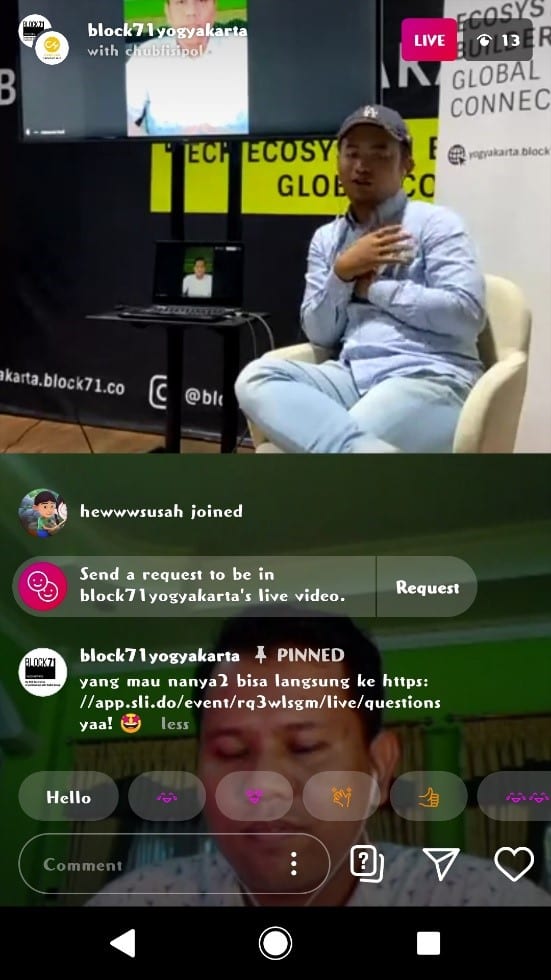
Yogyakarta, March 26th, 2020— Creative HUB conducted a sharing session with Kopi Chat – the signature event held once a month initiated by Block71 Yogyakarta. Creative HUB itself is a social incubator at the UGM Faculty of Social and Political Science (Fisipol UGM), whereas Block 71 Yogyakarta is one of the ecosystem builder or start-up partnerships in Yogyakarta between NUS Enterprise and Salim Group. Considering the COVID-19 Pandemic where physical interaction or meeting in person is prohibited, the session which formerly planned to take place at the BRI Work Fisipol UGM was altered via live stream on Instagram accounts of @block71yogyakarta and @chubfisipol on March 26, 2020, indeed at 16.00 WIB.
The sharing session entitled “Social Impact Start-up in the Agriculture Sector” brought two speakers. The first one is Adenanda Hadi as a CEO of Sida Tani (Village Ecosystems and Agriculture) representing Creative HUB and Ishaq Firdaus as the CEO of Kandang.in from Block71 Yogyakarta.

Preceding to the essence of the discussion, the speakers explained each start-up they supported. “Sida Tani is a collaboration of two start-ups, tani kepyar and also the local start-up, where these start-ups both concern in the fields of villages agriculture. Finally, we formed a team and collaborated on how to solve problems in the village or agriculture.
We found there was a problem in the village ecosystem, which is the business processes in the village were not going well. We tried to open the way of village products to reach the customer easier. We started by giving the capacity building to the farmers, where they are the main focus for the village ecosystem to be able to develop into a good ecosystem with a good supply. We provide various facilities, such as the production facilities for the farmers, capacity building, ecosystems where they are able to work by agriculture-tourism, and there are also seminars and exhibitions,” explained coherently by Mr Ade.
“Social impact start-up focused on the fields of agriculture, livestock, and fisheries. Smart Kandang (Cage) itself is a start-up accommodates the process of chicken farming, replacing the manual method with technology or machinery to reduce human intervention. But it still has to lead to the same goals, which are to solve problems experienced by the people, like poverty,” said Mr Ishaq, who was vaguely heard due to network constraints.
Furthermore, Mr Ade also explained how to work around technology and financial literacy in the village in the collaboration. Based on his explanation, we need a more personal approach to the farmers, both individually and in groups, to determine the potential of their products. “We need to educate them by helping to ensure that their harvest can directly be sold to the market rather than through middlemen, and processed to both semi-finished materials and consumption ready. Also, the capacity building is useful so that they are able to do that and also lend facilities for production in order to practice the theory. Besides, we also establish networking, in DIY (Special Region of Yogyakarta) itself there is a cooperation between four districts, they support each other and entrust each other’s products,” said Mr Ade.
In this case, Mr Ishaq also agrees with Mr Ade. Mr Ishaq furtherly added that basically, the orientation of social impact start-up is not merely on profit pursuit, but more to has a positive impact and empowerment on the community. The object of social impact start-up is not only a general problem in society.
“Social impact does not always focus on the people, but also the waste problems or even Corona that are closely related to SDGs (Sustainable Development Goals/Pembangunan Berkelanjutan),” said Mr Ishaq. After the speakers finished the discussion, the moderator invited the audience to ask through the question box provided. Even though it is online-based, the sharing session happened livelily and went with the plan. In the end, the event closed at 17.00 WIB.
